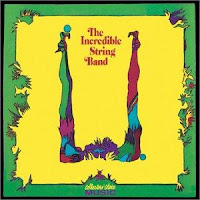 Although my musical tastes range widely, I wouldn't have described myself as a world music aficionado in my youth. A notable exception to that, however, has to be the group often pegged as having been a pioneer in that genre, Scotland's highly eccentric Incredible String Band.
Although my musical tastes range widely, I wouldn't have described myself as a world music aficionado in my youth. A notable exception to that, however, has to be the group often pegged as having been a pioneer in that genre, Scotland's highly eccentric Incredible String Band. There are so many ISB songs that I could single out for examination. Their albums were feasts of exotic musicality - often featuring instruments no one had ever heard of - and metaphysics - contemplating larger questions than was typical, even for that time. Their songs weren't structured the way other songs of that era were, and were exponentially longer than most. And their albums had fabulous names like The Hangman's Beautiful Daughter and Liquid Acrobat As Regards The Air ... and U.
Rainbow, which was the last cut on the double album U, still brings me to tears. Some think of it as a love song, but its message of connectedness to something much larger than oneself is what stood - and still stands - out to me. In no way did I want a steady diet of that sort of music - Lord knows I was too contemplative as it was - but the way ISB did it got my attention and kept it for years.
One of the later albums by the core group that most people consider to be ISB - Robin Williamson, Mike Heron, Rose Simpson and Licorice McKechnie - U briefly became a stage show with a performance ensemble called Stone Monkey. I did see them that year in Washington, D.C., although by the time I did, the stage show was defunct from lack of funds. In addition to the songs, the show had mime, skits and dance and many music critics thought they'd gone off their rockers.
Although they were horrified by the conditions under which they had to do it, and few people know this (including me until just now) because there's not much recorded footage of the event, ISB did perform at Woodstock in 1969. Their set as originally scheduled occurred right when a downpour descended, so they refused to go on with all of their electrical equipment and were replaced by Melanie, who wrote Lay Down (Candles in the Rain) about the experience. When they finally did play the next day, after Canned Heat, the crowd wasn't into it and it was not one of their finer moments. A longer account of this debacle is here.
Woodstock appearance notwithstanding, ISB was pretty far out of the commercial mainstream although various artists of the time - Dylan, McCartney, Robert Plant - were either influenced by them or called them a favorite band. People have an urgent need to categorize everything, it seems, but ISB defied description and I would put them in a class by themselves.



